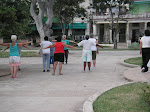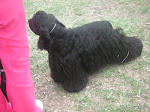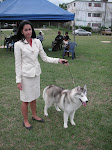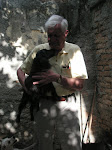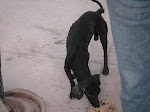Mad Dogs and Englishmen Go Out in
the Noonday Sun
A mile and a half from our home is
a giant Walmart, perhaps the size of three football fields. It is stuffed with all kinds of food and
merchandise, much of it made in China. It
is so close we often run over there for any needed item. So yesterday Charlene and I got in the car,
drove the short distance, and parked in the middle of a vast parking lot, even
bigger than the store itself,
Charlene no sooner had her door
open when she said, "There are dogs locked in that car," meaning the
small Ford van next to us. We both
became worried as it was a hot Florida summer day with few clouds to break up
the direct sunlight.
It wasn't the first time we were
in that situation in the same parking lot.
The two dogs were energetically barking at us as I tried all the doors
on the van. Even the windows were
tightly closed. I figured the van with
the dogs had not been there very long, as they showed no signs yet of too much
heat.
We bolted off to the store office,
thinking we could get them to make an announcement on the public address
system, but the manager told us it was store policy to tell us to call the
Sheriff's police. Charlene called while
I rushed back to the van to check on the dogs.
I had a specifically designed
window breaking tool that's pretty common in Florida, where many roads run
alongside canals, lakes, and bays. If a
car goes in the water, electric windows don't work, and you can drown if the
water is deep enough and you're in there long enough.
I'd never used the tool, and I inspected
it as I got it our of our car. It had a
hardened tip about an inch long with a sharpened point for glass
breaking. "That ought to do the
trick," I thought as I looked at my watch.
Nearly 20 minutes had gone by since we had arrived to find the trapped
dogs. I promised myself that if the
police don't get here soon, I'll use the tool whether it's legal or not.
Charlene was only a few steps
behind me. She had not only called the
Sheriff, but she'd called the County's Animal Services office and our vet's
office who then made other calls for help.
Shortly after she got back I was relieved to see a police car with two
deputies arriving.
As the police were brought up to
date, I checked the dogs—they were still fairly energetic, but I didn't know
how hot it was in the car. It had to be
over 100 by this time (nearly 1/2 hour after we discovered them. The police decided to wait for the Animal Services
van, which had been called and was on its way.
Fortunately the Sheriff's headquarters is less than a mile away.
I looked back at the store and saw
a man come into view around the corner of the building. He started running as fast as he could in our
general direction. On arriving in our
midst, he said" I only went into the store for one thing. It wasn't more than five minutes ago. The dogs are OK."
"That's a lie," I said, "we
got here 40 minutes ago, and they were locked in the car then." One of the police told the man to open the
car, and he unlocked and opened the driver's door.
The man had a thick neck and a
crew cut, and he was short and stumpy.
On top of all that, he was ugly.
He had a loud, almost overbearing voice, and he was obviously trying to
control the direction of the conversation.
He started a long string of questionable statements, trying to prove he
was a responsible pet owner. Here are
two examples of the several "excuses" he made:
·
The dogs were his best friends, and he'd give
his life for them.
·
He'd been in an accident in which his sister
died and he was badly injured, but he nevertheless saved his sister's dogs in
spite of serious injuries to his leg. He
showed us all an ugly mass of scars around his right knee. In his mind, all of this was somehow proof of
his love of dogs.
A tall, older man dressed poorly in an old tee shirt and
shorts, walked up to us, and it soon became clear he was a friend of Shorty,
the dog owner. He had been with Shorty when
they left the dogs locked up with no cooling.
I asked the Animal Services lady why one of them could not have stayed
with the dogs in the car with the air conditioner running. No one had a good answer for that.
One of the deputies made Shorty start the car and the air
conditioner. All three uniforms (two
deputies and the Animal Services officer) took down all our names, addresses
and phone numbers. The AS officer
squared off in front of Shorty, and told him she was going to ticket him twice,
once for each dog. She was very
definite. Also it was possible she could
confiscate the dogs and he could recover them the next day the next day by
paying a fine.
Well then Shorty shifted into high gear and protested like
he'd been stabbed in the heart.
"Please, please, puh-leeze. Don't give me a ticket. I'm a substitute teacher, and I have to work
tomorrow. Please don't do this."
We could see this could go on forever, and we still had not
bought the few things we came for, so we left confident the uniforms had the
matter well in hand. 20 to 25 minutes
later we left the store, our shopping done.
We had moved the car away from the arrest scene, but on our way out of
the lot, we once again drove near the place of all this drama. They were all still there, over an hour after
we had discovered the trapped dogs.
In a phone call to Animal Services the next day we found out
the dogs had not been confiscated, but two tickets had been issued to him. So Shorty, the loudmouth, got a little of what
he begged for, but I'm sure he'll think twice about leaving the dogs in the car
again.
On the other hand if he was capable of an act so stupid, it
may well be that he won't learn anything.
To the two dogs, I say, "Sorry guys, we did the best we could. Maybe you two should associate with a smarter
class of owners."
Les Inglis










































































